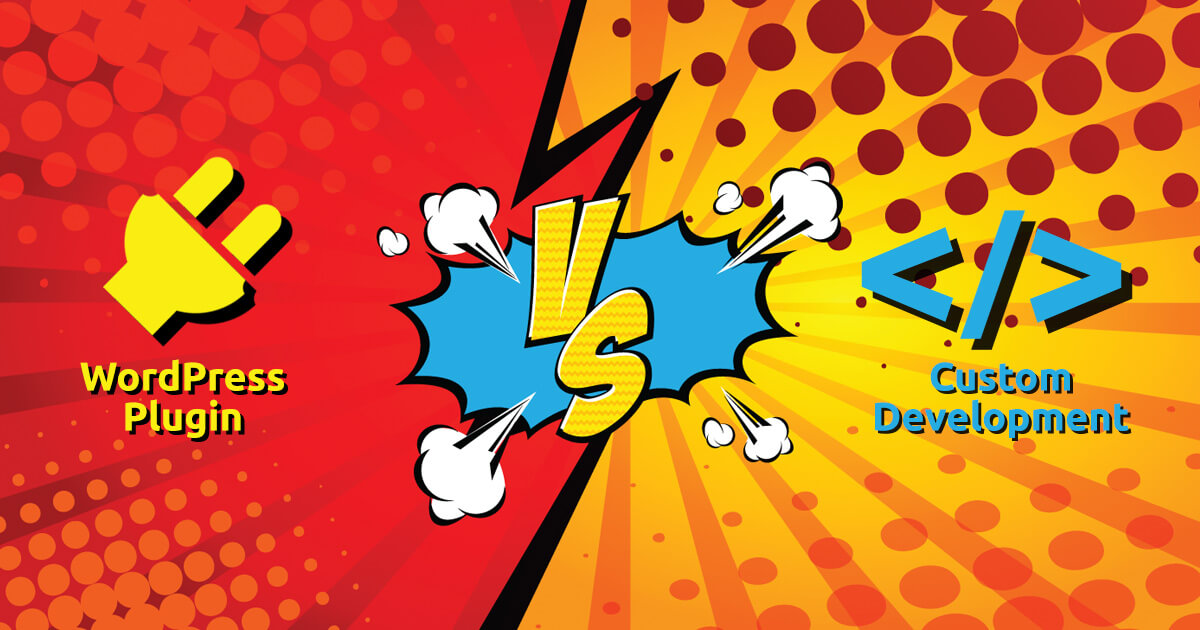WordPress Plugin vs. Custom Development?

A few weeks ago, one of my clients reported that their online payment page was no longer working. After some research, I discovered that a recent update to the plugin that drives the payment processing was conflicting with the website’s theme. Without going into too many details, we had to move the site over to a custom development solution. The plugin was no longer viable, even after some modifications to the theme. This brings up a very important question for WordPress website owners. How do you know when to choose a WordPress plugin vs. custom development?
As a development company, you might be surprised to know that we use plugins. We do! In fact, we have a list of favorite plugins, which I’ll share with you in the near future. Powerful plugins are what makes WordPress arguably the best CMS around. But, they have their place in the development process. There are times to use them. There are times to avoid them. And, even when you use them, there are some rules you should follow.
Quick Rules For Using Plugins
- Use plugins that are updated regularly. (last updated date should be within the last 4-6 months)
- Choose only plugins that have high ratings/reviews. 4.5 Star ratings and higher is recommended.
- Do some research. Search online forums for issues with the plugin you’re interested in using.
- Check if they offer tech support via their plugin page.
- Check for plugin updates each month and make sure you perform the update. But, be careful to backup your site first. Plugin updates can break your site if they conflict with your theme or other plugins on your site. Note, if you’re not comfortable doing these updates each month, check out our WordPress Maintenance Service. We can handle this for you.

Using plugins comes with extra responsibility. You need to manage your updates regularly while testing to see if those same updates broke your site.
When To Go With a Plugin
You should use a plugin when it clearly improves your ability to manage your website. For instance, I love using Ninja Forms. It’s a powerful form plugin that can be scaled up to do more than just send emails. It can integrate with MailChimp and it can even save your submission data directly to the site database for later use. Yoast SEO is another helpful plugin. This fantastic SEO plugin guides you through the onsite SEO process of writing content.
Plugins should enhance the user experience without hindering the delivery of the site content. They should improve your ability to use your site effectively either as a lead generation tool or an online brochure.
When To Go With Custom Development
In my opinion, plugins have no place in the core functionality of your website. They should never be used for creating 301 redirects or caching of any kind. And, most importantly, they should never be used for fundamental site behavior such as responsive navigations or mobile detection. Think of it this way, at some point, one of your plugins is going to fail. Do you really want it to be responsible for the main functionality of your site?
Plugins should consist of the icing, not the cake. If plugins are responsible for delivering your core functionality, your site is vulnerable to epic failure.
So, who won? You guessed it. It depends. Keep plugin use to a minimum and only for added behavior that improves the usability of your site. Don’t rely on them for the core functionality of your site. Instead, get custom developed solutions that are reliable and don’t require regular updates. I hope this helps you decide when to use a plugin or go with custom development. If you have any questions on this or anything else development related, contact us.
